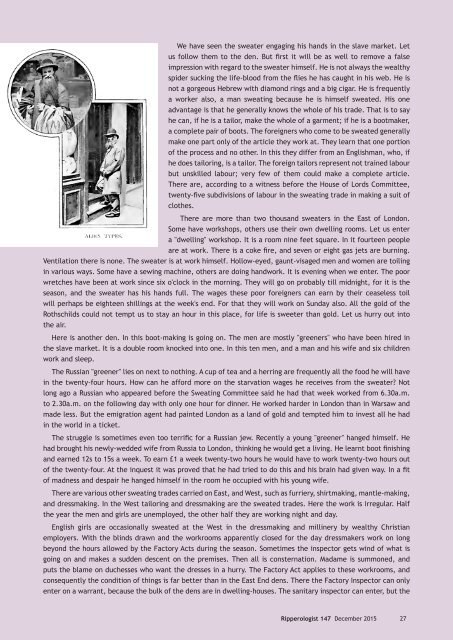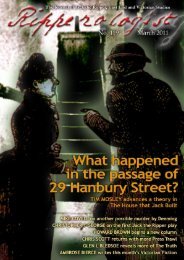Edmund Reid
nuhf574
nuhf574
Create successful ePaper yourself
Turn your PDF publications into a flip-book with our unique Google optimized e-Paper software.
We have seen the sweater engaging his hands in the slave market. Let<br />
us follow them to the den. But first it will be as well to remove a false<br />
impression with regard to the sweater himself. He is not always the wealthy<br />
spider sucking the life-blood from the flies he has caught in his web. He is<br />
not a gorgeous Hebrew with diamond rings and a big cigar. He is frequently<br />
a worker also, a man sweating because he is himself sweated. His one<br />
advantage is that he generally knows the whole of his trade. That is to say<br />
he can, if he is a tailor, make the whole of a garment; if he is a bootmaker,<br />
a complete pair of boots. The foreigners who come to be sweated generally<br />
make one part only of the article they work at. They learn that one portion<br />
of the process and no other. In this they differ from an Englishman, who, if<br />
he does tailoring, is a tailor. The foreign tailors represent not trained labour<br />
but unskilled labour; very few of them could make a complete article.<br />
There are, according to a witness before the House of Lords Committee,<br />
twenty-five subdivisions of labour in the sweating trade in making a suit of<br />
clothes.<br />
There are more than two thousand sweaters in the East of London.<br />
Some have workshops, others use their own dwelling rooms. Let us enter<br />
a "dwelling" workshop. It is a room nine feet square. In it fourteen people<br />
are at work. There is a coke fire, and seven or eight gas jets are burning.<br />
Ventilation there is none. The sweater is at work himself. Hollow-eyed, gaunt-visaged men and women are toiling<br />
in various ways. Some have a sewing machine, others are doing handwork. It is evening when we enter. The poor<br />
wretches have been at work since six o'clock in the morning. They will go on probably till midnight, for it is the<br />
season, and the sweater has his hands full. The wages these poor foreigners can earn by their ceaseless toil<br />
will perhaps be eighteen shillings at the week's end. For that they will work on Sunday also. All the gold of the<br />
Rothschilds could not tempt us to stay an hour in this place, for life is sweeter than gold. Let us hurry out into<br />
the air.<br />
Here is another den. In this boot-making is going on. The men are mostly "greeners" who have been hired in<br />
the slave market. It is a double room knocked into one. In this ten men, and a man and his wife and six children<br />
work and sleep.<br />
The Russian "greener" lies on next to nothing. A cup of tea and a herring are frequently all the food he will have<br />
in the twenty-four hours. How can he afford more on the starvation wages he receives from the sweater? Not<br />
long ago a Russian who appeared before the Sweating Committee said he had that week worked from 6.30a.m.<br />
to 2.30a.m. on the following day with only one hour for dinner. He worked harder in London than in Warsaw and<br />
made less. But the emigration agent had painted London as a land of gold and tempted him to invest all he had<br />
in the world in a ticket.<br />
The struggle is sometimes even too terrific for a Russian jew. Recently a young "greener" hanged himself. He<br />
had brought his newly-wedded wife from Russia to London, thinking he would get a living. He learnt boot finishing<br />
and earned 12s to 15s a week. To earn £1 a week twenty-two hours he would have to work twenty-two hours out<br />
of the twenty-four. At the inquest it was proved that he had tried to do this and his brain had given way. In a fit<br />
of madness and despair he hanged himself in the room he occupied with his young wife.<br />
There are various other sweating trades carried on East, and West, such as furriery, shirtmaking, mantle-making,<br />
and dressmaking. In the West tailoring and dressmaking are the sweated trades. Here the work is irregular. Half<br />
the year the men and girls are unemployed, the other half they are working night and day.<br />
English girls are occasionally sweated at the West in the dressmaking and millinery by wealthy Christian<br />
employers. With the blinds drawn and the workrooms apparently closed for the day dressmakers work on long<br />
beyond the hours allowed by the Factory Acts during the season. Sometimes the inspector gets wind of what is<br />
going on and makes a sudden descent on the premises. Then all is consternation. Madame is summoned, and<br />
puts the blame on duchesses who want the dresses in a hurry. The Factory Act applies to these workrooms, and<br />
consequently the condition of things is far better than in the East End dens. There the Factory Inspector can only<br />
enter on a warrant, because the bulk of the dens are in dwelling-houses. The sanitary inspector can enter, but the<br />
Ripperologist 147 December 2015 27




